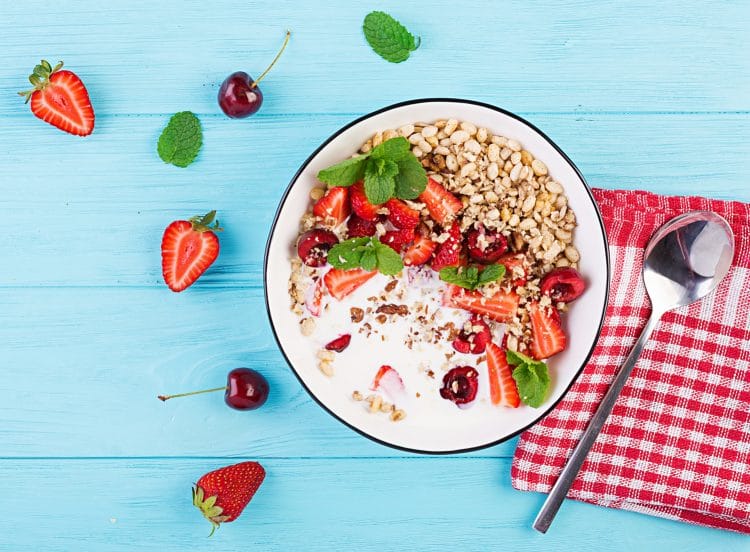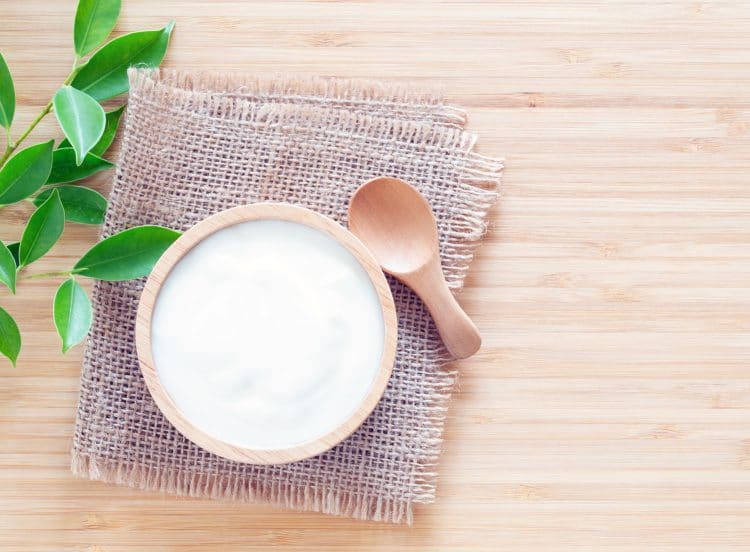Greek yogurt is high in protein and calcium, low in fat, and rich in probiotics. Greek gods might have really been impressed by us humans on the day they created Greek yogurt.
Following a chicken breast with rice and egg whites with oats diet can be boring. I do not know about you, but I almost fell asleep writing the last sentence.
Greek yogurt brings a ray of hope and flavor to the otherwise insipid life of a fitness enthusiast. It is a perfect healthy snack on weekdays and an awesome cheat meal side dish on weekends.
How To Make Greek Yogurt?
Regular and Greek yogurt are cultured (or fermented) dairy products. Fermented dairy products are made by converting lactose (milk’s naturally occurring sugar) into lactic acid by using certain bacteria, also called starter cultures.
Both regular and Greek yogurt is made with the same main ingredients – fresh milk plus Streptococcus thermophilus and Lactobacillus bulgaricus as starter cultures. The difference in texture, taste, and nutrients comes from the making process.
Next Read: Our List Of 40 Great Protein-Packed Foods
1. Regular Yogurt
Regular yogurt is the result of heating milk, adding bacteria, and leaving it to ferment until it reaches an acidic pH of about 4.5. Although the final product has a smooth consistency, it may vary in thickness.
2. Greek Yogurt
Greek yogurt (aka concentrated or strained yogurt) is made by eliminating whey and other liquids present in regular yogurt.
Usually, yogurt is strained in cloth bags up to three times until it reaches the desired texture and thickness. Modern production methods make use of centrifuges to achieve the same effect.
Since most of the liquid is removed, Greek yogurt is much thicker and tangier than regular yogurt. It is also generally more expensive since it requires more milk.
Must Read: What is Whey Protein and How to Use it
Comparison between Regular and Greek Yogurt
Although regular and Greek yogurts both are excellent sources of magnesium, iodine, and vitamin B12, Greek yogurt contains about half the carbs and sugar compared to regular yogurt. Getting rid of whey from Greek yogurt eliminates some of its lactose, reducing its overall sugar and carb content.
At the same time, the Greek variant contains almost twice the amount of protein as regular yogurt.
Check Out: Testosterone And Sugar
Greek Yogurt Nutrition Content
Greek yogurt comes in many varieties, including flavored and unflavored, full-fat, reduced-fat, and fat-free. Here is the nutrition value breakdown of a 200 gram serving of low-fat, plain, unsweetened Greek yogurt:
- Calories: 146
- Protein: 20 grams
- Fat: 3.8 grams
- Carbs: 7.8 grams
- B12: 43% of Daily Value (DV)
- Riboflavin (B2): 35% of DV
- Pantothenic acid (B5): 19% of DV
- Vitamin A: 20% of DV
- Calcium: 18% of DV
- Phosphorus: 22% of DV
- Potassium: 6% of DV
- Zinc: 11% of DV
- Selenium: 45% of DV
Benefits of Eating Greek Yogurt
Given Greek yogurt’s nutrient-rich profile, it has the following health benefits:
1. Aids in Weight Loss
The protein-rich nature of Greek yogurt leads to a prolonged feeling of fullness, which may help reduce your calorie intake. A review of 22 studies concluded that yogurt consumption is linked to lower body fat, less weight gain, and smaller waist circumference.
Remember – eating sweetened versions of Greek Yogurt or eating it as a cheat meal side dish will not help you lose weight. For you to carve your dream physique, you need to follow a healthy lifestyle.
Related: How To Track Your Progress Like a Pro
2. Good Source of Protein and Other Nutrients
Only a few other foods can match the nutrient-dense nature of Greek yogurt. Have you ever wondered why bodybuilders are so crazy about protein?
Apart from its muscle-building property, as per research, the macronutrient is needed for virtually all chemical reactions in the body, healthy immune function, tissue repair, and much more.
Greek yogurt is rich in essential vitamins and minerals including selenium (required for optimal immune function), and zinc, and B12 (needed for red blood cell formation, energy production, and nervous system function).
Check Out: Important Diet Habits To Implement For A Healthy Immune System
3. Suitable For Lactose Intolerant People
Lactose intolerance is the inability to fully digest sugar (lactose) in dairy products. It usually occurs due to a deficiency of an enzyme in the body called lactose. The symptoms can include abdominal cramps, bloating, and diarrhea.
People with milk intolerance might be able to tolerate yogurt because its probiotics support lactose digestion. Besides, Greek yogurt’s naturally lower lactose content makes it suitable for milk intolerant people.
Watch: Insane Calf Cramps We have Ever Seen & How to Stop Muscle Cramps
4. May Improve Heart Health
As per research, yogurt may improve heart disease risk factors, including cholesterol and high blood pressure. Fermented dairy intake can lower the risk of plaque buildup and artery stiffness – the most common culprits behind heart diseases.
A study conducted on 73,882 adults with high blood pressure concluded that eating two or more servings of yogurt per week can lower the risk of stroke in men by 21% and 17% in women, compared with those who ate less than one serving per month.
A different study found that non-fermented dairy was associated with a greater risk of developing heart issues compared to its fermented counterpart.
5. Rich in Probiotics
Probiotics are friendly bacteria found in fermented foods that help lower cholesterol levels by impeding certain enzymes.
Probiotics aid digestive health by balancing your gut micro binge (good bacteria in your gut) and help reduce your risk of inflammation and various illnesses.
Research also suggests that eating yogurt regularly can help support a healthy digestive system by increasing bacterial diversity.
Tip: Purchasing yogurt with a “Live & Active Cultures (LAC) seal” ensures that the Greek yogurt has a significant amount of probiotics that might help improve your gut health.
6. May Improve Bone Health
Greek yogurt contains protein, calcium, magnesium, and phosphorus, all of which are necessary for maintaining a healthy skeletal system. Not only does Greek yogurt contain nutrients required for bone health maintenance, but it also helps with increasing bone formation.
A small study conducted on young men found that consuming Greek yogurt daily while following a 12-week resistance-training program increased bone formation and decreased bone breakdown compared with a placebo.
Related: Best Bodybuilding Programs for Beginner, Intermediate, and Advanced Lifters
Choosing the Right Greek Yogurt
There are many Greek yogurt options to choose from on the market. Most of these products are loaded with artificial colors, preservatives, and added sugars. None of which, as you might have guessed, is good for you if you are on a mission to carve the physique of your dreams.

Every Greek yogurt brand on the market offers various options. The calories within these products differ slightly depending on the percentage of fat and sugar it contains. Interestingly, most of these products offer the same amount of protein content.
Pre-requisite: Reading nutrition value labels before buying any food item should become second nature if you want to stick to the fitness lifestyle for the long term.
Check Out: How Many Calories To Eat Per Day Calculator
Here is how to choose the best Greek yogurt:
1. Check the Ingredient List
No two yogurts on a grocery aisle are the same. Although all yogurts start plain, by the time they reach a grocery store, they can contain ingredients like sugar, artificial flavors, preservatives, stabilizers, and dyes.
The rule of thumb should be to choose a yogurt with as few ingredients as possible. The fewer the ingredients, the closer it will be to its natural form. The preferred ingredient list includes milk, bacterial cultures used to turn milk into yogurt, and nothing else.
Tip: Ingredients on a nutritional info list are listed by weight, so avoid yogurts that have sugar listed near the top.
Related: The Greatest Healthy Grocery List For Improving Your Health
2. Prefer Yogurt with Live Cultures
The benefits of probiotic bacteria (aka live cultures) include:
- Strengthens your immune system.
- Improves symptoms of irritable bowel syndrome.
- Reduces the risk of antibiotic-associated diarrhea in children and adults.
- Improves symptoms of lactose intolerance.
All yogurts contain live cultures in the beginning since they are the ingredients that turn milk into yogurt. But, the probiotic content of yogurts can vary depending on factors like packaging methods and storage conditions.
To get the most bang for your buck, choose the yogurt variant with the most probiotic content. You should avoid yogurts that are heat-treated or pasteurized after probiotics are added. Pasteurization kills the bacteria that must be alive to benefit you. The pasteurized yogurts usually have a label that says “heat-treated after culturing”.
3. Low-Fat vs. Full-Fat
Dairy-based yogurt can be made from whole, low-fat, or fat-free milk. Although low-fat or fat-free dairy may be lower in calories, reduced-fat yogurt usually contains more sugar. The excess sugar is added to make up for the loss of flavor from fat. If you favor the low-fat version, make sure you pick the one without added sugar.
Most people make the mistake of thinking that full-fat yogurt is a less healthy choice as it contains comparatively more calories. Contrary to this opinion, the fats found in full-fat dairy products may be beneficial.
Both plain unsweetened low-fat and full-fat yogurt can be healthy. Choose the one based on your dietary habits, food preferences, and calorie goals.
4. Limit Added Sugar
Added sugar is the main culprit that can turn yogurt from a healthy food into a less healthy one. Eating excess sugar can be linked to the following health conditions:
- diabetes
- obesity
- heart disease
- liver disease
- metabolic disease
Although yogurt contains some natural sugar in the form of lactose (milk sugar), many brands add more sugar on top to give the yogurt a sweeter taste.
When picking your yogurt, choose the option with the least amount of sugar per serving. Meaning – choose a variant with as little sugar as possible over the seven grams per cup that is already present from lactose.
Related: Calculate your TDEE
Healthy Greek Yogurt Recipe For Bodybuilders
If eating Greek yogurt out of a cup does not interest you, use the following recipes to make yogurt a part of your daily routine.
Pre-Workout Greek Yogurt Recipe: Peanut Butter Protein Shake
Before a workout, eating a good amount of complex carbs can ensure you have enough fuel to power through your training routine. Drink the Greek yogurt pre-workout shake 60-90 minutes before your workout so that fat contents get enough time to digest.
The pre-workout shake contains protein from Greek yogurt and carbs and fats from peanut butter. This yogurt recipe will ensure you have enough energy to destroy your workout.
Related: Best Pre-Workout Supplements
Ingredients:
- 175g (3/4 cup) of greek yogurt
- 1 tbsp peanut butter
- 2 tbsp powdered peanut butter (no sugar added)
- 150g frozen banana (1 large banana)
- 1 cup almond milk (can substitute with milk of choice)
Directions:
- Add all ingredients to a blender.
- Blend until smooth.
It could not get any easier than this, right?
Serves: 1
Macro Content: 377 calories, 30g protein (31%), 48g carbs (46%), 10g fat (24%).
Tip: For a higher calorie option, increase the number of bananas or add 1-2 tablespoons of oats.
Related: Protein Shakes: Before or After a Workout?
Post-Workout Greek Yogurt Recipe: Greek Yogurt Parfait
Do you crave a little something sweet after a grueling training session? The parfait might be the perfect post-workout meal for you. This parfait is high in carbs and protein with a healthy dose of fat.
Greek yogurt is excellent to eat after a workout because of its high-quality protein nature. Adding additional carbs with your yogurt can help fasten the recovery process.
Related: 8 Ways to Speed Up Recovery After Training
Ingredients
- 175g (3/4 cup) of greek yogurt
- ⅓ scoop chocolate whey protein powder
- 1 cup strawberries (150g)
- ⅓ cup granola
Directions
- Add Greek yogurt to a bowl.
- Add protein powder and stir until you get a smooth texture.
- Top with berries and granola.
Serves: 1
Macro Content: 368 calories, 32g protein (34%), 41g carbs (43%), 10g fat (23%).
Tip: For a higher calorie option, increase the number of granola or berries.
Related: Real-World Eating for More Muscle
Conclusion
Greek Yogurt is rich in a variety of nutrients and combined with its versatility, is an excellent dairy product for various culinary uses. It is a great addition to a bodybuilder’s diet as it can be consumed during bulking, maintenance, and shredding phases.
With the plethora of yogurt options available on the market, make sure you choose the right one for your goals. Remember: When it comes to yogurt, keeping it healthy means keeping it simple.
Tip: If you're signed in to Google, tap Follow.













